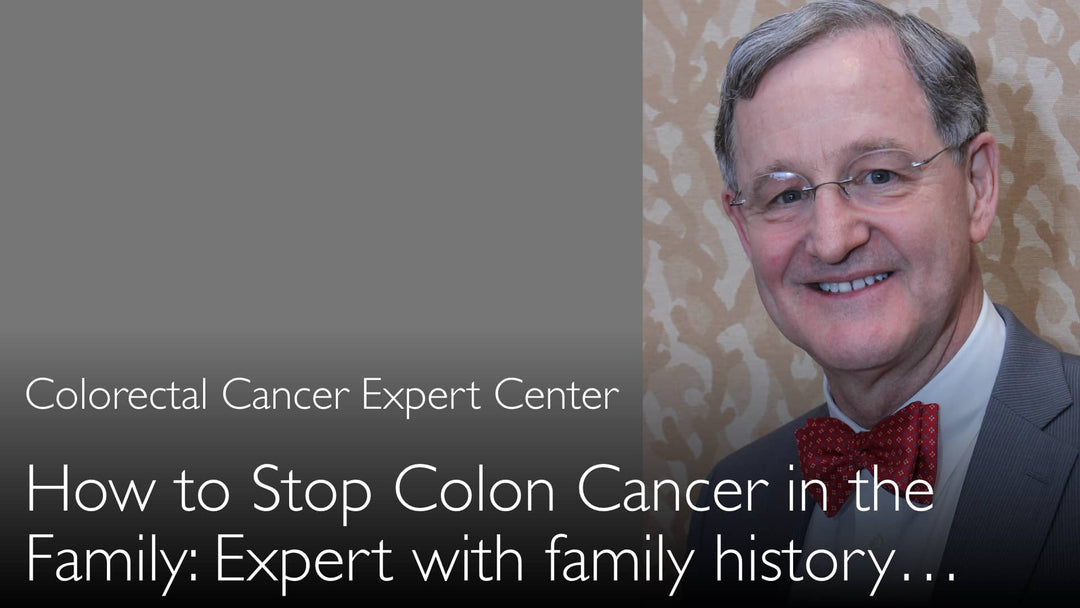Leading expert in colorectal cancer genetics, Dr. C. Richard Boland, MD, explains how hereditary colon cancer develops earlier than sporadic cases due to inherited gene mutations, why family history and biomarkers like microsatellite instability matter, and how genetic testing combined with preventive strategies can stop hereditary colon cancer before it starts.
Hereditary Colon Cancer Risks: Early Detection and Prevention Strategies
Jump To Section
- Early Onset Colon Cancer Explained
- Hereditary vs Sporadic Colon Cancer Pathways
- Why Family History Matters in Colon Cancer Risk
- Genetic Testing for Hereditary Colon Cancer
- Effective Prevention Strategies for High-Risk Patients
- The Role of Biomarkers in Colon Cancer Detection
- Full Transcript
Early Onset Colon Cancer Explained
Dr. C. Richard Boland, MD clarifies that "early onset colon cancer" typically appears decades sooner in hereditary cases compared to sporadic cancers. While average colorectal cancer diagnosis occurs around age 68, familial cases often develop before age 50 due to inherited genetic mutations that accelerate cancer development.
Hereditary vs Sporadic Colon Cancer Pathways
Dr. C. Boland, MD, explains the critical difference between these cancer types. Sporadic cancers require two acquired mutations in cancer-causing genes like APC, usually accumulating over decades. In hereditary cases like familial adenomatous polyposis (FAP), patients inherit one mutated APC gene copy, giving every colon cell a "head start" toward cancer transformation.
This genetic predisposition explains why hereditary colon cancers develop earlier - sometimes in patients' 20s or 30s - with nearly 100% lifetime risk without intervention.
Why Family History Matters in Colon Cancer Risk
Dr. C. Richard Boland, MD emphasizes that family history of early-onset colon cancer should trigger immediate vigilance. "If colon cancer occurs in younger family members, they should be screened early," he advises. Dr. C. Boland, MD, also notes uterine cancer history can signal Lynch syndrome, another hereditary condition increasing colorectal cancer risk.
First-degree relatives of hereditary colon cancer patients have a 50% chance of carrying the same mutation, making detailed family history collection essential for prevention.
Genetic Testing for Hereditary Colon Cancer
Dr. Boland strongly recommends germline genetic testing when family history or tumor biomarkers suggest hereditary risk. "Finding these mutations changes everything," he explains. Positive results allow testing of at-risk relatives and implementation of preventive measures before cancer develops.
Microsatellite instability (MSI) testing of tumor tissue serves as a key biomarker indicating potential Lynch syndrome, guiding who should pursue comprehensive genetic testing.
Effective Prevention Strategies for High-Risk Patients
For mutation carriers, Dr. C. Richard Boland, MD outlines two main prevention approaches: intensive surveillance and prophylactic surgery. Increased colonoscopy frequency (sometimes annually) can detect and remove precancerous polyps early.
In extreme-risk cases like FAP, preventive colectomy (colon removal) may be recommended in young adulthood. "These measures can completely change hereditary colon cancer's natural history," Dr. C. Boland, MD, notes, potentially eliminating cancer risk entirely.
The Role of Biomarkers in Colon Cancer Detection
Beyond family history, Dr. C. Boland, MD, highlights tumor biomarkers as critical risk indicators. Microsatellite instability testing identifies mismatch repair defects characteristic of Lynch syndrome. Immunohistochemistry can pinpoint specific defective proteins, while newer multi-gene panels test for multiple hereditary cancer syndromes simultaneously.
These tools help identify high-risk individuals who benefit most from genetic counseling and tailored prevention plans.
Full Transcript
Dr. Anton Titov, MD: How early is an "early onset colon cancer"? How to prevent hereditary colon cancer in current generation of family members? Why is history of uterine cancer important for colon cancer risks?
Dr. C. Boland, MD: In familial cases of colorectal cancer, the age of cancer onset is earlier than usual. One of the very interesting aspects of understanding the pathogenesis of colorectal cancer is that sporadic cancers, which occur in the general population without specific germline mutations, go through the same general pathways of cancer transformation as hereditary cancers.
Sporadic cancers occur later in life because you have to acquire mutations in both copies of a cancer-causing gene. For example, in most people who have a sporadic adenomatous polyp, you get biallelic inactivation of the APC gene. Something happens to one allele, and then something happens to the other gene allele. It can be a mutation, deletion, or gene methylation.
But if a person has familial adenomatous polyposis, they are born with a germline mutation in one cancer-causing APC gene allele. Every cell in their entire colon is already primed for transformation into cancer and has a head start down that pathway. This is why the likelihood of getting cancer is much higher and the onset occurs at an earlier age.
Dr. Anton Titov, MD: Obviously, if somebody knows of a family history of colorectal cancer, especially when colon cancer occurs in younger family members, they should be vigilant and screen for colon cancer, visit a doctor, and have a preventive program to identify potential precancerous lesions.
Dr. C. Boland, MD: Correct! If the family history is suggestive of colon cancer, or if there are some biomarkers we can find—such as microsatellite instability in colon cancer tumor—germline genetic testing is appropriate. This will tell us whether this person has a very high risk of colon cancer.
It will also alert us if the patient's siblings and children need to be genetically tested. When you find one of these germline mutations, every first-degree relative has a 50/50 chance of inheriting the same colon cancer-causing gene and having the same increased risk for colon cancer.
If we discover this risk before a person ever gets sick, we can completely change the natural history of hereditary colon cancer. It might involve more colonoscopies or a preventive operation to remove the colon, but it will keep hereditary colon cancer from ever occurring.







